

Megan
Packaging Matters Infographic. Gartner Surveys Confirm Customer Experience Is the New Battlefield - Jake Sorofman. Every year, my colleague Laura McLellan looks into marketers’ pockets.
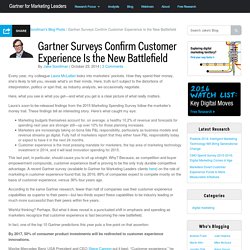
How they spend their money, she’s likely to tell you, reveals what’s on their minds. Here, truth isn’t subject to the distortions of interpretation, politics or spin that, as industry analysts, we occasionally negotiate. Here, what you see is what you get—and what you get is a clear picture of what really matters. Laura’s soon-to-be-released findings from the 2015 Marketing Spending Survey follow the marketer’s money trail. These findings tell an interesting story. Marketing budgets themselves account for, on average, a healthy 10.2% of revenue and forecasts for spending next year are stronger still—up over 10% for those planning increases.Marketers are increasingly taking on bona fide P&L responsibility, particularly as business models and revenue streams go digital.
Beauty Halls Become Hyper Personalised Private Salons. Beauty shoppers are expecting more than just a stand packed with powders, lipsticks and primers when they enter a beauty hall.
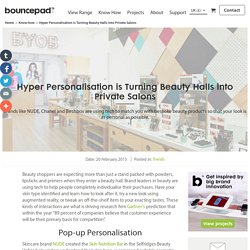
Brand leaders in beauty are using tech to help people completely individualise their purchases. Have your skin type identified and learn how to look after it, try a new look using augmented reality, or tweak an off-the-shelf item to your exacting tastes. These kinds of interactions are what is driving research firm Gartner’s prediction that within the year “89 percent of companies believe that customer experience will be their primary basis for competition”. Pop-up Personalisation Skincare brand NUDE created the Skin Nutrition Bar in the Selfridges Beauty Hall to help visitors understand their skin type, recommend suitable cosmetic products, and suggest a dietary program for healthier skin. Premium Beauty Gets Personal. One of the key themes explored in this year’s Premium Market Report 2015, is the trend for personalised products and experiences.
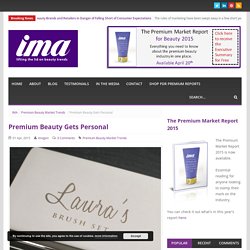
It’s a trend that is happening wherever you look and reflects consumers’ rejection of mainstream sameness in favour of something that has been carefully constructed with their needs in mind. Premium brands have, of course, been playing the customisation/bespoke game for years. It’s what singles them out from the mass market. However, recently this hasn’t been the case as pressure to go global and chase volume has meant that many premium values have been dropped. Instead, premium beauty has become more like mass. Personalisation is key. The festive season is here.
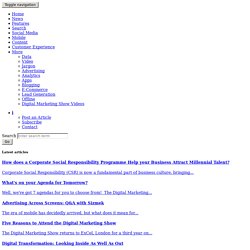
Bring on the bustling of the high street, and the voluminous clicks of online surfing for Christmas gifts – to bring smiles to friends and family. Changes to State Pension Age. Serving aging baby boomers. In less than 10 years, age 50+ consumers will control the economy for the first time in history.
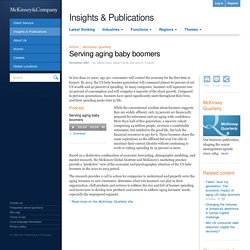
By 2015, the US baby boomer generation will command almost 60 percent of net US wealth and 40 percent of spending. In many categories, boomers will represent over 50 percent of consumption and will comprise a majority of the share growth. Fast broadband for all by 2020 pledged by David Cameron. Euromonitor International - Log in. Embodied Cognition: What It Is & Why It's Important. Definition of “multisensory” Redefining the “Lipstick Effect”– Examples of Recession-Proof Categories. When an economy enters troubled waters, this does not spell bad news for all categories.
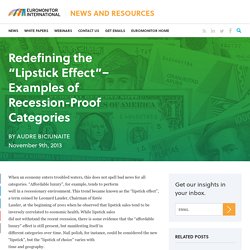
“Affordable luxury”, for example, tends to perform well in a recessionary environment. This trend became known as the “lipstick effect”, a term coined by Leonard Lauder, Chairman of Estée Lauder, at the beginning of 2001 when he observed that lipstick sales tend to be inversely correlated to economic health. While lipstick sales did not withstand the recent recession, there is some evidence that the “affordable luxury” effect is still present, but manifesting itself in different categories over time. 50+ fascinating stats about mobile commerce in the UK: 2015.
In 2015 the shift towards mobile asserting itself as the dominant user device for shoppers has become unavoidable.
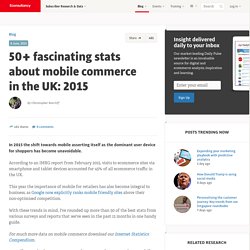
According to an IMRG report from February 2015, visits to ecommerce sites via smartphone and tablet devices accounted for 45% of all ecommerce traffic in the UK. This year the importance of mobile for retailers has also become integral to business, as Google now explicitly ranks mobile friendly sites above their non-optimised competition. With these trends in mind, I've rounded up more than 50 of the best stats from various surveys and reports that we've seen in the past 12 months in one handy guide. For much more data on mobile commerce download our Internet Statistics Compendium. Modern life 'turning people off sex' 26 November 2013Last updated at 03:39 ET By Nick Triggle Health correspondent, BBC News More than 15,000 people were polled about their sex lives Money worries and the distractions of social media mean people are having sex less frequently, researchers say.

How the Sense of Taste Has Shaped Who We Are. What is flavor?
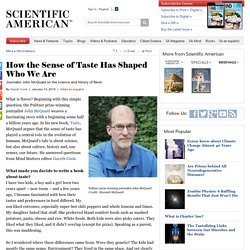
Beginning with this simple question, the Pulitzer prize-winning journalist John McQuaid weaves a fascinating story with a beginning some half a billion years ago. In his new book, Tasty, McQuaid argues that the sense of taste has played a central role in the evolution of humans. McQuaid’s tale is about science, but also about culture, history and, one senses, our future. He answered questions from Mind Matters editor Gareth Cook. The future of brands in a post-human world. The media has bought the 'robot takeover' narrative and after Sky’s week of robot programmes, this week the BBC embarks on more of the same - pumping out the post-human scenario that the world is about to be transformed by the exponential growth of artificial intelligence.
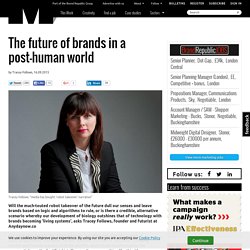
It goes something like this: it’s a world in which between 35% and 80% of the human population is unemployed due to the mass automation of many jobs and entire industries. It is a world in which super intelligence has taken over everything else. Forbes Welcome. Home. 1 In 10 British Men Are ‘Secret' Make-Up Wearers, Survey Finds. Many British men are secretly wearing make-up to hide their imperfections, a survey has revealed. According to the findings, 1 in 10 men have turned to cosmetics to enhance their appearance, with men from Newcastle most likely to wear make-up, followed closely by men who come from Essex.
Cosmetics & Fragrances. This Key Note Market Update examines the UK market for cosmetics and fragrances in terms of the value of sales in the marketplace, and the trends and issues impacting the industry and its competitors, focusing in particular on the past 5 years between 2009 and 2013, in addition to providing forecasts for the future of the market up until 2018. Key Note estimates that the cosmetics and fragrances market in the UK has witnessed strong and steady growth in value over the past 5 years, rising by 5.6% in 2013 alone.
The two sectors within this market as examined by this report are cosmetics, which include make-up and skincare products for the face, eyes, lips and nails; and fragrances, which include both women’s and men’s fragrances. UK beauty industry review. The UK beauty industry is in the pink. Employing more than one million people and worth £17 billion, it is forecast to grow 16 per cent by 2016. Despite the recession, retail sales in the UK beauty market grew 15.5 per cent from £6.1 billion in 2008 to an estimated £7.1 billion in 2013. “The beauty industry needs to be recognised for its economic contribution,” says Caroline Neville, president of industry body Cosmetic Executive Women (CEW). Breakdown of the cosmetic market worldwide 2014, by product category. Common Sense: The Rise of Sensory Marketing - B2B International. More than ever, consumers and businesses alike are inundated by advertisements from a range of media.
All this marketing has had a “wear and tear” effect on our attention and receptiveness to the messages being communicated. We have become less susceptible over time to traditional advertisement methods. As a result, marketers are challenged with differentiating their marketing amid the clutter, colours and sounds of everyday life. One emerging strategy is the use of sensory marketing. This is a form of marketing that engages the consumers’ senses and aims to affect their perception, judgement, and behaviour.
A recent article published by the Harvard Business Review looks at research being conducted in this field and highlights examples of sensory marketing that on the surface may not seem like marketing at all. Sight The traditional sense used in marketing is sight. The Science of Sensory Marketing. For two decades marketers in a variety of industries have been building expertise in reaching consumers through the five senses—learning to deploy cues, such as the sting from a swig of mouthwash and the scritch-scratch sound of a Sharpie pen, that can intensify perceptions of brands. The past year has brought a rush of interest in the subject among academics.
New research suggests that we’re about to enter an era in which many more consumer products companies will take advantage of sense-based marketing. Much of the new research centers on “embodied cognition”—the idea that without our conscious awareness, our bodily sensations help determine the decisions we make. Multisensory marketing is the future. Beauty is big business for Britain.
Revenue of the cosmetic industry in the U.S. 2002-2016. History of the Beauty Industry - Beauty Resource. The UK beauty industry is worth £17 billion and employs around one million workers nationwide1, making it one of the most lucrative industries in the country. Key trends for retail technology in 2015: the rise of hyper-personalisation.
This year, customer experience management will be mostly focused on customer personas, rather than portfolios. Can retailers bring personalisation from clicks to bricks? Can retailers bring personalisation from clicks to bricks? Online retail survey2014. Retail & e-commerce: Why forward-thinking retail brands are focusing on personalisation, user generated and shoppable content. Personalisation in Retail - Retail Assist. Personalisation: The best examples of how retailers are customising shopper experiences. Retail Gets Personal: Why Personalising the Customer Experience should be your #1 Priority. In a recent Gartner report, we learned that 89 per cent of marketing leaders expect customer experience will be the primary basis for competitive differentiation by 2017.
Personalisation: The best examples of how retailers are customising shopper experiences. Econsultancy. Transforming Your Retail Customer Experience: Building An Apple Store Experience On A Budget. I Got DNA Tested to Determine My Skin Care Regimen. Getty Images Advertisement - Continue Reading Below. UK high street has worst month since 2008. Cosmetic store and organic cafe merged in Nendo's Beauty Library. Cosmetic store and organic cafe merged in Nendo's Beauty Library. Beauty and the book: Nendo designs concept store for Japanese cosmetics company Nature's Way. Nendo's Beauty Library presents organic cosmetics like books.
Selfridges' Fragrance Lab attempts to distill personality into scent. Burberry lures buyers into flagship store. Burberry Regent Street pilots interactive technology. Burberry Launches Interactive, Multimedia Store In London. Makeup Genius App - Virtual Makeup Application Tester - L'Oréal Paris.
L'Oreal Releases Makeup Genius App Which Turns Your Camera Into Virtual Mirror. Selfridges' Fragrance Lab attempts to distill personality into scent. Marketplace powered by Enterprise Nation. Distillation apparatus forms centrepiece in Aesop Nottingham. Deloitte-uk-digital-influence-in-uk-retail-2014. Digital influence in UK retail. You've Got Smell: 1st 'Scent Message' Sent from NYC to Paris.
Style Psychology: Brand Experience and Consumer Behaviour Consultancy in Retail and Hospitality. Multi-sensory retail: why stores must appeal to all five senses. Why multi-sensory shopping could save the high street - European Retail Blog.